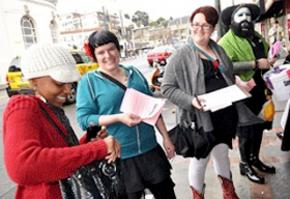Rallying to save Lyon-Martin
reports on the community fight for Lyon-Martin Health Services.
ON JANUARY 25, the board of directors of San Francisco's Lyon-Martin Health Services--one of the city's nine independent, community-based, sliding-scale clinics, and the only one in the state specifically focused on care for lesbians, bisexual women and transgender people--announced the imminent closure of the clinic, due to financial reasons.
The news sparked an immediate community response. The loss of Lyon-Martin would mean the loss of one of the few safe spaces for women and transgender people to access excellent, compassionate health care.
Lyon-Martin--named after Phyllis Lyon and Del Martin, founders of the Daughters of Bilitis, the first lesbian rights organization in the U.S.--was established in 1979 to provide safe, comfortable health care access for lesbians who had stopped seeking health care due to negative, traumatic experiences at the hands of bigoted health care providers.
Unfortunately, a clinic of this type is still desperately needed today. Both straight women and lesbians still experience sexism and homophobia when seeking health care.

Further, transgender people experience discrimination at a truly appalling rate from the medical community: a 2010 survey done by the National Center for Transgender Equality and the National Gay and Lesbian Task Force found that 70 percent of trans people had experienced some form of discrimination from health care providers, and 50 percent of respondents reported having to educate providers on their needs.
Add to this the fact that women and trans people are disproportionately represented at and below the poverty line, and it's obvious that Lyon-Martin has provided an invaluable, irreplaceable service for the thousands of people it has served in its 32-year history.
According to its Web site, Lyon-Martin cared for almost 2,500 patients in 2010, 84 percent of whom fell 200 percent below the federal poverty line. Lyon-Martin provides a range of health care services from preventive exams to HIV management to transition-related care, including providing hormones to 400-plus transgender patients who would otherwise have had to turn to the black market. Clearly, Lyon-Martin is as needed in San Francisco as ever.
AS THE recession deepened, Lyon-Martin saw a pattern that many clinics, shelters and food pantries saw: demand has gone up, while donations have gone down. Plus, due to California's ongoing budget catastrophe, MediCal--the state's Medicaid program--put a freeze on its payments to the clinic over the summer of 2010.
The Department of Public Health and the city's Community Clinic Consortium provided loans and a consultant to try to help Lyon-Martin climb out of its hole, while the clinic made a series of cuts to staff, supplies and salaries during 2010. The scale of the problem was just too great, however, and in January, the board began the process of shutting the doors.
The press release with the announcement included a request for help from Dawn Harbatkin, Lyon-Martin's medical director and interim executive director: "We're looking to community members to support us at this time. Any money raised will be used to help reduce our debt in hopes of continuing patient care." Lyon-Martin's immediate debt is around $500,000, but the fundraising goal is set at $250,000, an amount that will allow the clinic to keep its doors open and give it a chance to reorganize.
The community responded within 12 hours, with a public forum on the clinic's crisis attended by over 150 people. Lyon-Martin's PayPal page actually went down within 24 hours of the press release going out due to an overload of traffic, collecting $9,000 before it crashed.
Over the course of the week following the press release, a series of fundraisers was independently organized, ranging from major events at bars, to activists asking for donations on street corners, to a local volunteer-run bike maintenance shop pledging to donate all of its income for two weeks. By January 31, just six days after the board announced the clinic's closing, over $200,000 had been pledged and donated to keep Lyon-Martin open.
There is still work to do to address both the clinic's larger immediate debt, as well as questions around ongoing funding, but the way the community has rallied to keep this vital service alive provides a glimpse into both the potential and the necessity of building a united fightback against the austerity measures being leveled against the working class and poor.


